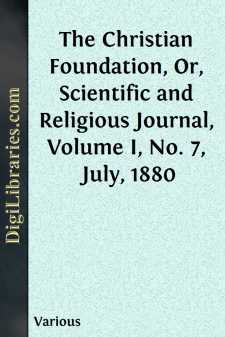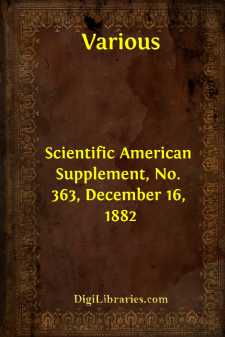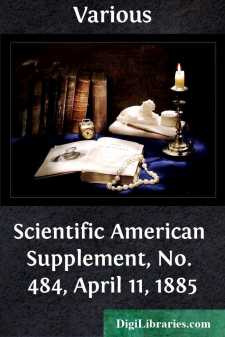Categories
- Antiques & Collectibles 13
- Architecture 36
- Art 48
- Bibles 22
- Biography & Autobiography 813
- Body, Mind & Spirit 142
- Business & Economics 28
- Children's Books 15
- Children's Fiction 12
- Computers 4
- Cooking 94
- Crafts & Hobbies 4
- Drama 346
- Education 46
- Family & Relationships 57
- Fiction 11828
- Games 19
- Gardening 17
- Health & Fitness 34
- History 1377
- House & Home 1
- Humor 147
- Juvenile Fiction 1873
- Juvenile Nonfiction 202
- Language Arts & Disciplines 88
- Law 16
- Literary Collections 686
- Literary Criticism 179
- Mathematics 13
- Medical 41
- Music 40
- Nature 179
- Non-Classifiable 1768
- Performing Arts 7
- Periodicals 1453
- Philosophy 64
- Photography 2
- Poetry 896
- Political Science 203
- Psychology 42
- Reference 154
- Religion 513
- Science 126
- Self-Help 84
- Social Science 81
- Sports & Recreation 34
- Study Aids 3
- Technology & Engineering 59
- Transportation 23
- Travel 463
- True Crime 29
The Christian Foundation, Or, Scientific and Religious Journal, Volume I, No. 7, July, 1880
by: Various
Categories:
Description:
Excerpt
THE FOUNTAIN OF HAPPINESS.
The source and fullness of created good is the knowledge and enjoyment of God. "Give what thou wilt, without thee we are poor; and with thee rich, take what thou wilt away." The wicked are like a ship's crew at sea, carried by the winds upon unknown waters, without peace or safety until they can renew communications with the shore. A man alienated from his God is without his proper relations, and separated from the fountain of happiness, is like a child unconscious of his father—an orphan, forced along, the sport of accident, with no hope for the future, but darkness that may overshadow his pathway to the tomb. If we were at once deprived of all knowledge of God where would we find hopes for support in the gloomy hours of adversity? What sadness would reign over the world! What black despair! O, what a chasm it would make to strike the Infinite One out of existence! "The angels might retire in silence and weep, or fly through infinite space seeking some token of the Father they had lost. With unbounded grief and despair they might wing their way farther and farther, with their harps all unstrung, and every song silent, and the soul-harrowing words, 'We have no Father, no God, a blind chance rules,' might be all that would break the awful silence of heaven. Let the glorious words once more be heard, 'God reigns, he lives, he reigns,' and what joy would fill the heavens and the earth." The child of sorrow would lift up his head and say, "Our Father who art in heaven." The heavenly songsters would string anew their harps, and send the good news far and wide, "He lives, he reigns, God over all, blessed forever."
"We are not able to estimate the effect it would produce to blot the knowledge of God from the universe. We can not appreciate the state of that mind which labors under the impression that God is retiring. Perhaps we have one momentary example of the sad gloom that takes possession of the man under such circumstances. It is seen in the Savior's dying words, 'My God! my God! why hast thou forsaken me?'"
In our nature and condition there are two sources of misery—the mind, or conscience, disturbed by sin, and the body affected by disease and death. Sinful emotions cause disquietude, uneasiness, sorrow and misery, bitterness, recrimination, reciprocated treachery, infuriated rage, malignant and stormy passions; envy, jealousy, suspicion and unlawful desires distract the mind and quench its joys. Who can be happy in such a condition? Disquieted and corrupted affections cause the greater part of the unhappiness or misery of the race. The angels of light could not be happy in such a murky sea. Our great ancestors were doomed to toil in a world of disappointment and sorrow for yielding to such a guide. Haman occupied a high position at the court of Persia, yet he made himself miserable because "Mordecai the Jew sat at the king's gate." And Ahab, on the throne of Israel, "refused to eat bread" because he could not get possession of the vineyard of Naboth. Men can not be happy with such passions reigning in the mind, and yet they are found in almost every bosom, unless it has been purified by the influence of the gospel of Jesus the Christ. The great idols of this world are fame, pleasure and wealth, and the love of these is the strong passion of the heart. But it is the most prolific source of individual, social and public misfortune, the most mischievous, contentious and demoralizing passion. The ambitious, the voluptuous, the rich and the great are not necessarily happy. Alexander wept upon the throne of the world because there was not another world for him to conquer.
In the midst of seminal pleasures and corrupt passions men are always miserable. The influence of the Gospel of Christ is the only remedy for such diseases. It saves men from aggravating selfishness and holds in check their fierce passions until they are extinguished. Virtuous affections are invariably the great sources of human happiness. They are fountains of living waters, which purify the mind and make their possessors happy. They are as rivers of water in a thirsty land.
In the teachings of Christ we learn all that pertains to true happiness, in what it consists and how to obtain it. There we are admonished of mere worldly blessings, because the desire for them is generally so intense that it becomes a source of corruption, and in our successes we often forget our highest interests. The Savior left in the background the commonly received notions of men touching the sources of true happiness....












